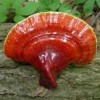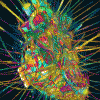My post is a bit long winded but but but....... ![]()
A comparison by Jeff Chilton (Nammex) of the active immune system, cancer fighting etc. components of whole mushrooms vs mycelium shows that whole mushrooms are considerably richer in health benefits by weight than mycelium based products. A varietyof beta-glucans are found in many plants, mushrooms including Reishi as well as health benefitting beta-glucans in Larch trees for example, sold as "Larix" supplements. However, they are not all the same, nor is their immune system value.
I have long utilized Reishi, Lion's Mane, Maitake, Turkey Tale, Shiitake, Cordyceps, Agaricus blazei and others for immune system boosting, sometimes on a daily basis. If I feel a hint that a cold might be coming on, I double up on the dose. I rarely get colds and haven't had the flu in years, I know that is not proof, just saying is all. I encourage my family to take such products for illness and also before getting on a plane to avoid catching anything. We believe it helps.
I am a mushroom collector hobbiest, not in any related business.
On a side note, I have collected all of the above mushrooms except Cordyceps and Agaricus blazei in wild parts of Asia and North America and have also traded these mushrooms with other pickers who swap them by mail from many places. I am not affiliated with Chilton's firm nor have I met him, but some of my friends know him and say he is honest and knows his shit. I have met Stamets half a dozen times. A friend, Cliff Bradley, a molecular biologist who specializes in fungi since 1980 discovered that certain mycelium, namely Pleurotus ostreatus in a short time breaks down spilt oil into harmless, non toxic elements. They are in the early stages of possibly utilizing such myeclium on the devasting, dreadful, massive Texaco oil spill in the Ecuadorian Amazon. Furthermore, Cliff's friend, Paul Stamets brought that landmark discovery to fame on TED and in other talks and in his book "Mycelium Running."
Okay, back to mushroom supplements, most companies' extracts of these mushrooms are made from the underground web of the mushroom, rather than the above ground "flower" carpophore. The reason is that growing whole mushrooms is much more difficult and more expensive in many cases. Studies, journal articles on the health benefits of mushrooms are largely undertaken using whole mushrooms and not from mycelium for the most part. Therefore we must question whether the health benefits of musrhooms also occur in myelium based products and that is exactly what Chilton's long awaited study does.
Redefining Medicinal MushroomsA new scientific screening program for active compounds
Executive SummaryThere is significant concern within the regulatory community regarding health claims made about nutritional supplements as well as about the identity and purity of the natural products themselves. Medicinal mushrooms are a category that has experienced high growth but few actual quality control standards. The following White Paper provides an analytical program that enables manufacturers to realize a higher level of product integrity and efficacy.
- The proper identification and delineation of “plant part” is clarified. A basidiomycete organism has 3 main parts: a mycelium, mushroom and spore.
- Key active compounds are identified as beta-D-glucans, triterpenoids and ergosterol. Starch is utilized as an indicator of adulteration. Analytical methods which can quantify the key active compounds are identified and used to test approximately 100 mushroom and mycelium samples.
- Results of the analyses demonstrate that mushrooms are high in beta-D-glucans and very low in starch. Mycelium produced on cereal grains is low in beta-D-glucans and high in starch. Ergosterol analysis shows the actual amount of fungal material in the products.
- Mushrooms grown on natural substrates have the precursors to produce important secondary metabolites such as triterpenoids whereas mycelium produced on cereal grains lack these precursors.
Most mushroom extract companies erroneously detail polysacharide content of their products as a measure of quality and value, but the problem there is that their products if mycelium based, are grown on rice hulls and other grains with high starch content and starch itself is high in polysacharides, the starch remains in the final product in many cases, so the measure is irrelevent since what you what you want to know is the beta-D-glucan content. From Nammex: "Polysaccharide tests are not valid since they also measure alpha-glucans such as starch."
The study from Jeff Chilton compared the target beta-glucan content of mushrooms vs myeclium and found that many mycelium extracts contain paltry amounts of the target beta-glucans. He also lists medicnally actie triterpenoid and also ergosterol content. I know little about these compounds. Next up I would love to hear what dosage is necessary for health benefits per illness, but as with many herbs, ther are a darth of studies specifying that.
Reishi mushroom compared to reishi mycelium products grown on grainBeta-glucansStarch0255075100MushroomMushroomMushroomMyceliumMyceliumMyceliumMyceliumMyceliumMyceliumMyceliumMyceliumRiceOatsSorghumPercentagesBeta-glucans Starch Mushroom 28.1 0.1 Mushroom 26.8 0.6 Mushroom 25.4 0.5 Mycelium 6 29.6 Mycelium 10 31.5 Mycelium 4.5 48.9 Mycelium 9.5 20.4 Mycelium 12.9 31.5 Mycelium 1 38.9 Mycelium 1.1 51.4 Mycelium 7.3 45.2 Rice 1 74 Oats 1 58 Sorghum 2 64Three different reishi mushroom cultivars have very consistent levels of beta-glucans and less than 1% starch. All commercial mycelium on grain samples had approximately 10% or less of beta-glucans and in some cases only 1%. Starch levels are consistent with the excess grain substrate.
Beta-glucan and starch comparison: fruiting bodies vs mycelium on grain products Basidiomycete Part Beta-glucan Starch Blended Mycelium Products 5 Mycelium blend 15.26% 27.81% 7 Mycelium blend 3.42% 41.93% 16 mycelium blend 3.2% 66.4% Whole Chaga Mushroom 6.79% 1.05% Chaga mycelium 4.18% 28.22% Chaga mycelium 7.36% 44.14% Whole Cordyceps militaris mushroom 34.36% 1.65% Cordyceps mycelium 1.5% 64% Cordyceps mycelium Cs4 7.58% 1.71% Whole Maitake mushroom 32.4% 1.6% Maitake mycelium 3.46% 39.91% Maitake mycelium 6.38% 44.47% Whole Oyster mushroom 35% 0.9% Whole Reishi mushroom 28.1% 0.1% Reishi mycelium 1.06% 51.44% Reishi mycelium 7.3% 45.2% Whole Shiitake mushroom 28.2% 0.7% Shiitake mycelium 7.20% 38.88% Whole Trametes mushroom 49.3% 0.1% Trametes mycelium 6.70% 24.55% Trametes mycelium 9.06% 44.78%The above charts demonstrate:
- Mushrooms contain consistently high levels of beta-glucans.
- Mycelium on grain has consistently low levels of beta-glucans.
Mushrooms contain only minor amounts of starch, on average less than 3% of the dry weight. On average, mycelium products on grain contained 35-40% starch. This reveals that the grain is not converted into fungal tissue.
TriterpenoidsA second category of extensively researched active compounds in basidiomycetes are lipids known as triterpenoids.
Triterpenoids occur in significant amounts in a few important medicinal mushrooms, those being reishi, chaga, and Antrodia. Although reishi and chaga have some common classes of triterpenoid compounds, one still must procure a pure standard in order to accurately measure the quantity of these compounds.
Today ganoderic acid standards for reishi are available. Nammex has been utilizing an HPLC method developed from reishi research and has 15 years of testing experience. We have also developed an HPLC method for testing chaga triterpenoids.
From HPLC testing, we can confirm the following:
- Reishi mushrooms and mushroom extracts contain measurable amounts of triterpenoids
- Reishi mycelium contain no measurable amounts of triterpenoids
This is consistent with our historical record of triterpenoid testing dating back to 1994. This confirms the basic tenet that without precursor compounds, which primarily occur in natural substrates, important secondary metabolites are not produced in meaningful quantities.
There is a video of his findings, as well as a nice summary, I recommend you start with that, and thirdly an in depth paper many pages deep. I will link the video and the summary and you can download the entire 28 page study below too.
I also posted portions of this information a week ago on "supplements" but believe this topic needs greater exposure in this retailer/products discussion.
Overall, if you are fine with paying a lot more and taking much higher amounts of mycelium based extracts the health benefits may in many cases still be there, but it case by case, sometimes yes, sometimes no, depending on the particular mushroom and your target health goal, so to me it seems best to stick with whole mushrooms or whole mushroom extracts in many cases for now.
You can find organic mushrooms, with COA, most of which are grown in China. Of course Chinese pollution concerns hit the news often enough, making many wary of herbal and other consummable, edible products from there with good reason, but China is a huge country with polluted areas and as well as other regions that are farther from such polluted cores. Secondly, since many of these mushrooms are grown indoors air and water quality is checked with air and water filters, and independent COAs can tell you the degree if present, of heavy metals etc in the final product.
At the moment I am testing out three products from Chilton's company Nammex, they specify the beneficial target beta-D-glucan content as well as triterpenoid content, and are extracted from organic grown whole mushrooms. The extracts are far more strong tasting than the recent mycelium grown products I have bought elsewhere. The Cordyceps is the best I have had in years and provides and energy boost along with a noticeable increase in physical and sexual prowess. I have been disappointed with Cordyceps grown from mycelium, they seemed nearly ineefective while whole Cordyceps mushrooms products are a favorite, I can feel a subtle yet noticeably energy boost within hours.
A few other notes, Chilton's study also shows that whole Oyster mushrooms, Pleurotus ostreatus are extremely high in beta-D-glucan, at 35%. That mushroom I have been collecting locally in the last few weeks on fallen Cottonwood tree logs along riversides. I also have been finding Lion's Mane on a sevearl occasions lately as we do every year, and others are bringing them in locally to us. My aquaintances are a network of wild mushroom collectors and growers in the US, Canada and elsewhere, some do it as a business, others as a hobby.
A side issue, but for flavor, among the Oyster group I prefer Pleurotus eringi since it is the most delicious, known in the US as the King Oyster and have seen it sold at Whole Foods and elsewhere. Pleurotus ostreatus the more commonly found Oyster is more commonly available nationwide in grocery stores in the US. You could well find that immune system boosting benefits from expensive mushroom extracts will be equalled in many cases by simply cooking some up, and they are one of the tastier mushrooms compared at least to the boring white button mushroom that marketers have long pushed in consumer markets. When I can, I prefer good organic food to a pill or powder, especially if it is tasty!
Jeff Chilton co-authored with Paul Stamets one of the best books on home medicinal, culinary mushroom growing, "The Mushroom Cultivator." Many say that book is the "bible."
I am shocked to see that the summary on the Nammex webpage shows that whole Trametes versicolor "Turkey Tail" also called Coriolus has an astounding 49% beta-D-glucan content! Extracts of Trametes mycelium are listed at about 7-9%. Paul Stamets states that he cured his mother's cancer with Trametes after exhausting conventional medical interventions.
Video of Chilton's interview on whole musrooms vs myeclium:
Paper summary on that same topic: http://www.nammex.co...inal-mushrooms/
More info:
http://www.nammex.co...room-education/
Full 28 page journal article on that study, great diagrams and more: https://my.leadpages...64248772427776/
Nammex whole mushroom extracts, I bought the Cordyceps, Reishi and 5 Mushroom product: http://www.realmushrooms.com/
Whole organic Reishi mushrooms at a good price, they offer slices or powder, slices guarantee there are no adulturants in a powder. You should be able to grind the slices in a blender afterward. I have bought herbs from this company for many years and all have been high quality: https://www.mountain...-slices/profile






















































